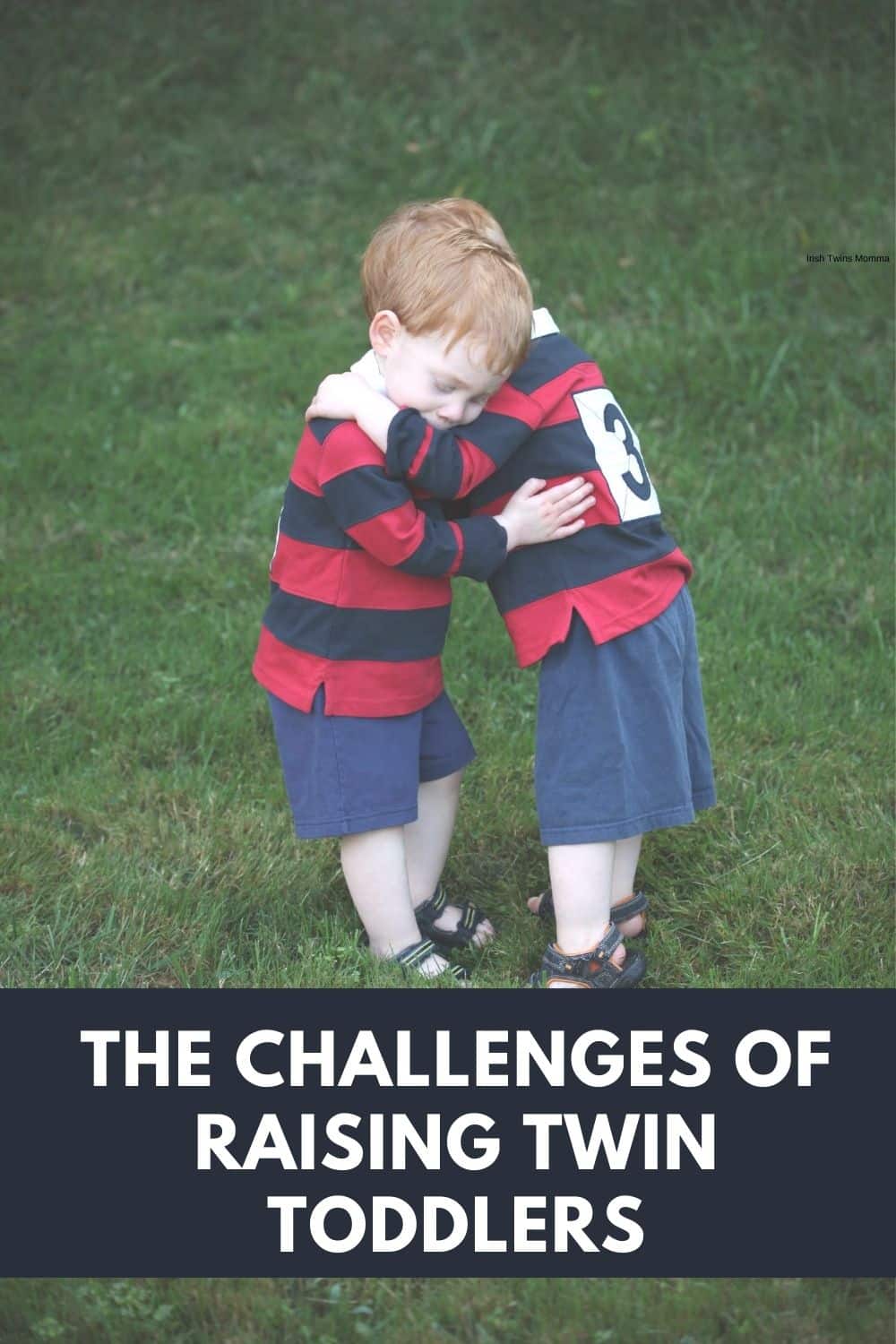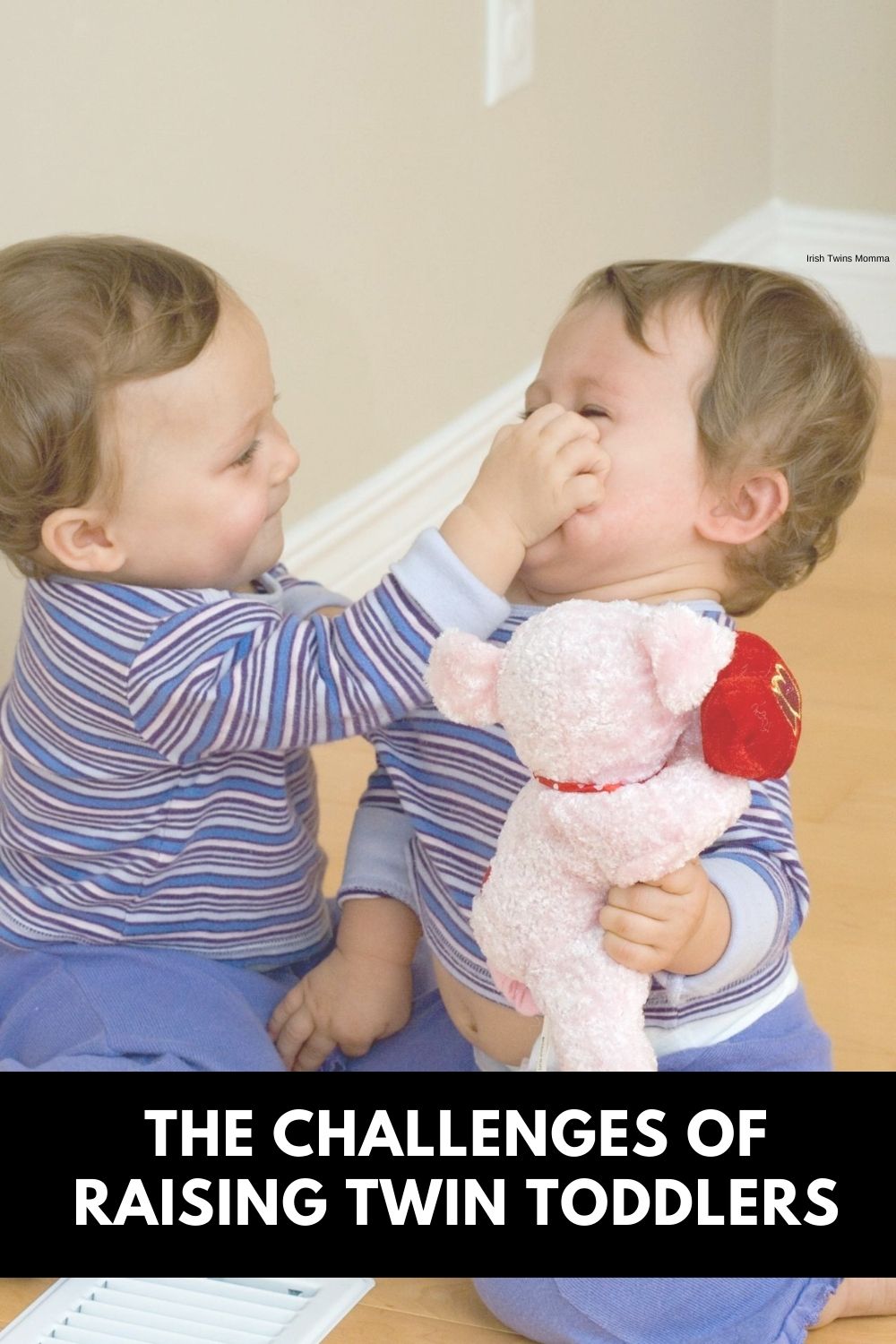This post contains affiliate links. If you click and buy, I may make a commission, at no cost to you. See my disclosure policy for more information.
More and more people are having twins. From 1980 to 2009, the twin birth rate rose a staggering 76%. Despite the decades-long surge in twin pregnancies, becoming a parent of multiples is still a unique experience that’s difficult to understand unless you’ve been through it.
“Double the fun, double the love.” Current and expectant twin parents hear this all the time. While it’s absolutely true, raising twins still comes with many distinctive challenges right off the bat. Those first days, weeks, and months of twin parenthood are emotionally and physically demanding. However, the toddler stage with twins is argued to be the most difficult.
Parents aren’t the only ones dealing with the challenges of toddlerhood with twins. Twin relationships can be complicated, from the beginning. Imagine having a built-in best friend who you share nearly all belongings, moments, and memories with. It can be a wonderful experience that feels special and full of love and understanding, but it can also be fraught with fighting and competition. All this while experiencing major developmental changes in motor, social, and intellectual skills can be emotionally demanding on your twin toddlers.
Below I’ve broken down some of the challenges both parents and their twins often face during toddlerhood — and how to deal with them. Ultimately, with every challenge comes some opportunity to help your twins develop and become themselves.
Fighting
Dealing with fights between siblings comes with the territory of having more than one child. Having twins who fight is different because of their similarities — such as shared interests (ever see a “toy tug-of-war?”) and going through the same difficult stages or milestones at the same time (like teething or potty training).
Toddler twins fight, not usually to be defiant, but instead because they are trying to express themselves without the right communication tools or emotional vocabulary needed to do so. This only makes them more frustrated and can result in screaming, hitting, biting, and full-on tantrums. As a parent, you want to prevent violence, but unless it reaches that point, some tactics worth trying are redirecting your twins’ attention, ignoring bad behavior (this strategy is described a bit in this post, and allowing them to work it out themselves with little to no intervention, and keeping your toddlers well-rested and occupied through daily routines.
Pecking Order
People often expect twins to be alike and are surprised to find out that their personalities have more differences than similarities. Twins can be as different as any siblings, they just happen to be born at the same time. Even as toddlers, their personalities lend themselves to establishing a pecking order: dominant vs. submissive.
This can be hard to witness as parents, especially at ages 2-4 when your twins aren’t communicating effectively and one twin continues to get their way, call the shots, and boss their other half around. However, it’s natural for twins to fall into asymmetrical roles that *actually* complement one another and have no bearing on their long term wellbeing.
In fact, you can chalk these roles up to each twin developing characteristics that distinguish them from each other and provide balance in their relationship. Rather than trying to get your more submissive twin to become more aggressive, accept these differences, and recognize that they will serve an important function in your twins’ relationships and development.
Identity Crisis
Despite differing personalities between twins, identity issues between twins are still apparent and are often brought on by others (i.e., parents, teachers, family friends). Parents tend to worry more about this in elementary school or later when picking sports or deciding if twins will be in the same class. Addressing it during toddlerhood, however, can help to determine whether your twins will identify as “we” or “I” during childhood and later in life.
The more that parents and other adults treat twins as their own person instead of a unit, the better. On the surface, twin identity can be addressed by allowing them to wear different clothing, encouraging separate playdates, and spending time with each of them solo. On a deeper level, parents should get to know each twin separately, explore who they are, and promote their individual interests. Beginning at toddler age, help your twins secure their own identity and create a balance between unity and separation.
Comparison & Competition
Sibling rivalry is a term you hear often. For twins, the meaning can be much deeper and more intense. Even as parents we have a natural tendency to compare siblings, and when you have two children growing up together simultaneously, those comparisons are more heightened.
Parents of toddler twins are constantly asked questions that compare twins, such as “why is only one walking?” or “which twin is the difficult one?” Comparing twins’ athleticism, intelligence, physical looks and more is a slippery slope and should be avoided in toddlerhood — otherwise, seamlessly harmless comparisons your twins make, like “who gets to play with the new toy first?” can turn into “who gets better grades?” or “who has more friends?” You also want to avoid twin labels such as “artsy” and “jock” that can pigeonhole your twin toddlers into becoming something instead of allowing them the freedom to explore who they are without being influenced by their twin’s abilities and the opinions of others.
Developmental Delays
One of the reasons it’s easy to compare twins to one another is that they develop at different rates. No siblings — whether twins or not — hit all milestones at the same exact time. For twins, however, there is more likelihood that development can be delayed. This is most common in language development.
According to the Journal of Speech, Language, and Hearing Research, twin toddlers are twice more likely than singleton children to have late language development. While it’s normal, if this issue presents itself, discuss it with your pediatrician. Continue to do language learning with your toddler twins to help them reach their verbal milestones, and try to talk to them each individually as much as possible.
Splitting Attention
For parents of twins, it’s impossible to give each the same level of attention as you would a singleton child. A lack of attention can unfortunately manifest itself in how a toddler twin acts, making them more likely to misbehave and push their luck when it comes to your patience. It also makes parents of twins feel guilty that they are unable to provide adequate one-on-one time during toddlerhood when your twins are at a prime age to start learning activities and are becoming more aware of their environment and the fact that they may not be getting all of mommy’s attention. Make a concerted effort to give them equal attention, ask for help from family and friends when you can, and understand that it’s ok if you have to tend to one twin while the other is upset. This actually teaches patience from an early age in twins. Go a step further and designate one-on-one quality time with your twin toddlers. For example, once a week each parent can take one twin out for a special outing where they can give their undivided attention.
Having twins is hard. Having twin toddlers is the next level! Understandably it’s so easy to get caught in the chaos and not pay close attention to what challenges are unique to twins and the implications they can have on their individuality, confidence, and relationship later in life. By addressing these challenges head-on, you can make toddlerhood with twins an enriching experience — not only for you as a parent, but for your twins, as well.
Sincerely,




Leave a Reply